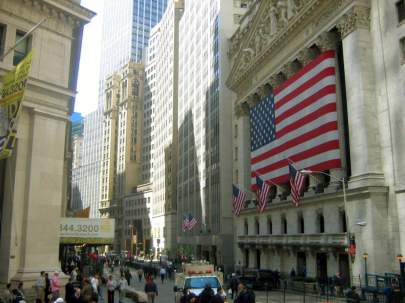China & Wall Street - A Faustian Bargain - By Laurence F. Sanford
By Laurence F. Sanford, ASCF Senior Analyst
October 18, 2022

Wall Street has a Faustian bargain with China. Wall Street makes billions of dollars in collaboration with the Chinese Communist Party (CCP). In return, Wall Street finances China's military/industrial complex the number one existential threat to America.
A Faustian bargain is a pact where one party trades something of supreme moral or spiritual importance for some worldly or material benefit. The term refers to the German legend of Doctor Faust, who knowingly agreed to surrender his soul to an evil spirit in return for access to worldly riches. It does not end well for Doctor Faust when, 24 years later, the devil claims his soul. Faustian bargains are, by their nature, tragic for the person or industry that makes them because what is surrendered is ultimately far more valuable (American security) than what is obtained (money).
Wall Street firms selling their souls to China include:
1. Black Rock Investment Management Company controls over $10 trillion in assets. Led by Larry Fink, who declared, “I continue to believe firmly China will be one of the biggest opportunities for Black Rock over the long term, both for asset managers and investors.”
a.Black Rock’s investments help prop up the Chinese Communist Party (CCP) and President Xi’s regime, which is repressive at home and aggressive abroad.
b.Fink has been referred to as the “architect of woke capitalism.” He has sought to weaponize pension funds through ESG (Environmental, Social, and Governance) to radically change the American economy and destroy America from within. Leveraging Black Rock’s vast pool of money, he is forcing corporate behavioral changes, especially in oil and gas companies.
2. Goldman Sachs (GS) operates wealth management companies in partnership with the China Construction Bank Corporation and the Commercial Bank of China, both state-run entities at the center of power in Communist China. Goldman is relinquishing much independence, data, and intellectual property to these CCP entities in return for table scraps in the Chinese financial markets.
a.In Washington, D.C., Goldman Sachs is a significant voice influencing U.S. policies by supporting Chinese interests to the detriment of America.
b.Influential former Goldman executives include John Thornton, former chairman of the Brookings Institute, and Henry Paulson, former Secretary of the Treasury under President George W. Bush.
3.Bridgewater, the world’s largest hedge fund, was founded by Ray Dalio. After the publication of his book “Principles” with its warm words about China, Bridgewater was granted the first foreign license to provide hedge fund investments to the Chinese people.
a.Dalio is troubled by American capitalism, saying it has “not worked well for ordinary Americans.” On the other hand, Dalio has warm words for China’s dictatorial leadership
b.Chinese government entities have invested billions of dollars in U.S. hedge funds, including Bridgewater. Dalio is a multi-billionaire.
c.Dalio excuses Chinese human rights violations and echoes the Chinese argument that America has its own civil rights issues.
4.Blackstone was co-founded by Stephen Schwarzman, who has deep and enduring ties with top Chinese Communist officials, including President Xi. In 2007, when Blackstone was going public, it found a new partner in the CCP, which bought a 9.9 percent stake. A 10 percent stake would have triggered a U.S. federal national security review in Washington.
a.Schwarzman is a cheerleader for the CCP and excuses China’s human rights abuses and theft of American intellectual property. He launched a $100 million scholarship program in China to rival the Rhodes Scholarships at Oxford. The Schwarzman Scholars will study at Tsinghua University, a training ground for the CCP leadership and elites.
5.JPMorgan Chase, Morgan Stanley, and Citigroup are all Wall Street companies financing China’s development in various ways.
Wall Street with China is doing what Wall Street does -make money. And the CCP is doing what communists do -lie and deceive to achieve world domination.
It is the role of the government to protect and defend its citizens. Our representatives should enforce and pass laws and institute government regulations to prevent Wall Street from using American monies to fund CCP organizations that are a threat to American national security. Instead of strengthening the CCP, we should be acting to weaken it and encourage a democratic form of government.
Our government is “of the people.” It is incumbent upon the citizen (you and me) to vote for representatives who will protect and defend us.
We have met the enemy, and he/she is us
Citizens of America - Vote




